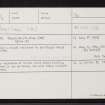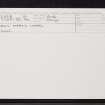Following the launch of trove.scot in February 2025 we are now planning the retiral of some of our webservices. Canmore will be switched off on 24th June 2025. Information about the closure can be found on the HES website: Retiral of HES web services | Historic Environment Scotland
Davoch Of Grange, Lady Hill, Grange Burial-ground
Burial Ground (Medieval) - (Post Medieval), Chapel (Medieval)
Site Name Davoch Of Grange, Lady Hill, Grange Burial-ground
Classification Burial Ground (Medieval) - (Post Medieval), Chapel (Medieval)
Alternative Name(s) Virgin Mary's Chapel
Canmore ID 17352
Site Number NJ45SE 8
NGR NJ 47932 51583
Datum OSGB36 - NGR
Permalink http://canmore.org.uk/site/17352
- Council Moray
- Parish Grange
- Former Region Grampian
- Former District Moray
- Former County Banffshire
NJ45SE 8 47917 51585
(NJ 4795 5158) Virgin Mary's Chapel. (NR) (Site of)
OS 6" map, (1959)
See also:
NJ45SE 3 NJ 48052 51541 St Ninian's Church (Grange Parish Church)
Originally a chapel dedicated to the Virgin Mary; ruinous in 1793.
Statistical Account (OSA) 1791-9.
Previous existence of chapel still known locally, although there is now no trace, the area being occupied by gravestone.
Visited by OS (RL) 28 July 1967.
INVENTORY OF GRAVEYARD AND CEMETERY SITES IN SCOTLAND REFERENCE:
Address: Grange Burial Ground, Davoch of Grange, Moray
Postcode: AB55 6RY
Status: In current use for burials
Size: 0.45 hectares, 1.12 acres
Polygon: Yes
TOIDs: 1000000173395239, 1000000173395241
Number of gravestones: c250-300 in older part, c150 in newer
Earliest gravestone: 1684
Most recent gravestone: 2003
Description: Graveyard associated with a church. Graveyard divided 50/50 between original and late 19th Century extension by stump of original W boundary wall. No visible sign of remains of church which was on the site and described as ruinous in 1793. Present replacement built in 1795 on adjoining site. At some time the decision was taken to place all flat stones upright, some in situ, but 17 resited and propped along the S boundary wall, facing N. A few stones are wall-mounted. Numerous late 20th Century stones, granite. Earlier stones mainly sandstone or freestone. Later ones mainly granite. Much of the texton earlier stones is hard to determine due mainly to lichens. The 'flats' generally have bevelled edges and some with faded relier mortality symbols. At least two of these have (unusually) a line of text running from bottom to centre, up the middle of the stone.
Data Sources: Graveyard Recording Form, 7 March 2003; OS MasterMap checked 14 June 2005.










